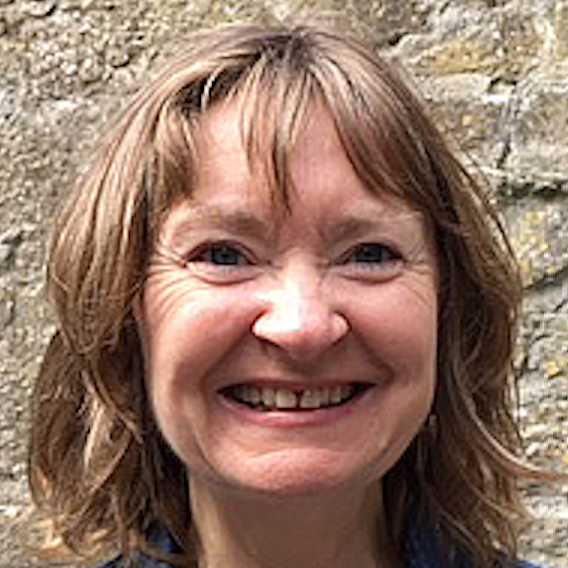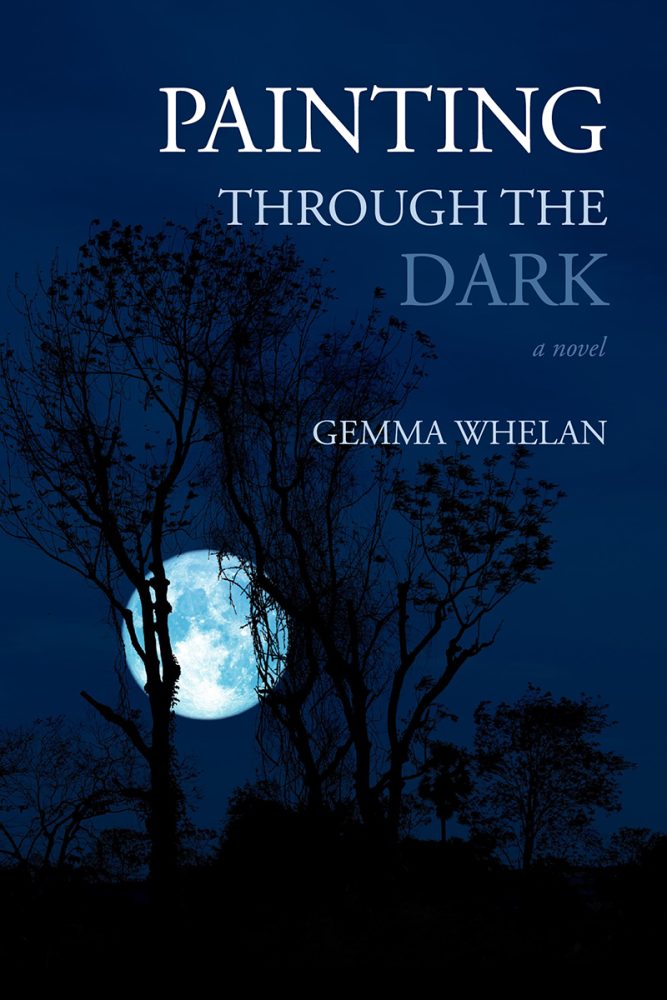
Today’s guest post is by Gemma Whelan, author of Painting Through the Dark.
It began with that heart-fluttering feeling of acceptance after so many rejections. My second novel was going to be published!
It was the end of August 2020. The world as we knew it had been upended. We were getting deeper into the pandemic, with fear, illness, death, and uncertainty ravaging the world. When New York City–based Adelaide Books offered me a contract to publish Painting Through the Dark, it set my heart racing in a good way. It was a promise.
The contract looked good: 20% royalties, paperback and ebook, quarterly reports, approval over the design and cover art. The marketing plan also sounded excellent: pre-publishing editorial review, all pre- and post-print marketing tools and services, design and maintenance of author’s website, magazine promotion and interview with author, social and blog posts, book video trailer, book giveaways to bloggers, and consideration for various literary competitions. Plus two free books for the author, and further books could be purchased at a 30% discount.
Then came this sentence: “All we ask of you is to pre-purchase 45 copies of your book (at 30% discount) upon signing the contract as a token of your support for our publishing endeavor.”
That’s when the happy heart flutter turned anxious. Was this legit?
I knew that after publication I’d order at least that many books for private events, but still. I checked the company out. They had been in business for several years and had offices in New York and Lisbon. They listed a large number of titles on their website. They attended the Frankfurt Book Fair every year, in addition to the Lisbon and Brooklyn book festivals. I asked around—friends who were published authors, others with knowledge of independent publishing. In their opinion it wasn’t a red flag. Several said it wasn’t unusual to ask authors to buy a certain number of copies up front. I was thrilled. This was the answer I wanted. I didn’t relish the long, soul-killing process of querying all over again. I squelched any remaining doubts and signed.
After finalizing the contract, communication was sketchy. Weeks would go by between emails. I knew Adelaide was a small company, and I was concerned about the large number of books on their roster. I finally requested a Zoom meeting and was reassured by a pleasurable, hour-long, wide-ranging conversation with the publisher. He clearly loved and believed in books. We talked about what to expect when my book came out—I was definitely coming to New York for the Brooklyn Book Festival, and he told me he would book me at the Strand bookstore and other NYC locations. Distribution was through Ingram. This was all working out.
After that call, the publisher wasn’t responsive to emails, but I convinced myself all was well. The dates for publication were pushed back a few times due to COVID, but I was fine waiting until it might be safe to do in-person readings. I thrive on meeting readers, having conversations, signing books.
After a couple of rounds of editing, Adelaide fell off the radar again. Even when I put URGENT, CONCERNED, PLEASE RESPOND, in the subject line of my emails, I got no response. I tried not to sound desperate, but I was. The publisher never answered the phone or replied to voicemail messages. My book suddenly appeared on Amazon in July 2022. No advance reader copies, no reviews, none of the publicity promised in the contract.
I approached local bookstores in Portland, Oregon, where I live, so I could set up readings. They all told me they couldn’t find my book on Ingram. I was embarrassed. I told them there must be some hold up as my books were definitely on Ingram. I said I’d get back to them after I spoke with my publisher.
I was back on the crazy rollercoaster—hopes raised, then dashed. In the meantime, I got wind of a private Adelaide authors Facebook page. My head thrummed when I saw that I was number 94 to join. I read the stories of all the other disgruntled authors, the voices of people in similar situations, others who had published way earlier and had no ebooks, no sales reports or royalties, or had books published with egregious errors.
I looked back and saw a pattern over the past two years. It was like being in a dysfunctional relationship. After reaching out over and over again, I’d finally get a carrot in the form of an email or call, and I’d be mollified for a while. Then the pattern would repeat. No communication, with my anxiety level rising. And the publisher had over 100 such relationships—authors like me who had spent years working on a manuscript, writing and re-writing, pouring our hearts out, investing our hopes and dreams. Now my hopes and dreams were turning to mulch.
I arrived in New York in early October 2022, with still a glimmer of hope that the books would magically appear for my reading as promised (in a rare email from the publisher). After all, the company was based in New York, the publisher himself lived there. I stood in front of a room full of people and put on the best face I could. I read. I squelched my embarrassment and explained how there was a glitch with the delivery and told them how they could order books online. What should have ended with book selling and signing ended instead with my deep-down certainty that this whole Adelaide venture was a disaster.
When I reached out to Authors Guild, they informed me that their lawyers had been sending letters to Adelaide since June with no response. They said they would add my name to the next letter naming authors seeking reversion of rights. They set up a Zoom meeting for Adelaide orphans and suggested we all file with the New York Better Business Bureau and New York State Attorney General. They requested we send our stories, and they would pitch to Publishers Weekly. I filed complaints with NYBBB and the Attorney General. I received replies saying they had attempted to contact Adelaide but received no response. The NYBBB added, “A firm’s rating may be affected by its failure to answer even one complaint. Your experience may, therefore, alert other inquirers seeking information through the BBB.” Hopefully filing complaints would help someone.
I was now in the awkward situation of having a book published and announced, and my publisher had gone AWOL. The overall consensus from my wonderful local writers community, combined with what I had gleaned from Authors Guild conversations, was that self-publishing was the only option open to me now.
My husband and I set up Shangana Press, named after the 1850’s farmhouse I grew up in in Ireland, with distribution through IngramSpark. I hoped the name would bring some much-needed luck. Several weeks later I had a new book. I’ve had wonderful readings at my local bookstores and am planning Bay Area and East Coast tours. I’m working on promotion and outreach. I’m applying to contests that accept self-published work. I’m reaching out to get reviews from the few publications that will accept a book post-publication.
On Feb 1, 2023, Publishers Weekly published Adelaide Books Promises to Make Things Right With Authors. The New York Better Business Bureau and the New York State Attorney General’s Office could not persuade the publisher to respond, but when the Authors Guild approached him regarding their intent to publish in Publishers Weekly, he came forward. Whether Adelaide ever returns the money, rights, files, or royalties, they can never make up for the hurt, anger, frustration, and lost time. Neither can they make up for the loss of all of the vital pre-publication reviews, advance review copies, contests, or the stigma that still persists in some quarters around self-publishing.
The big takeaway? Trust your gut. Adelaide never presented themselves as a hybrid publisher, but by asking for money upfront, in the form of a book purchase, they were acting like one. They lied about distribution through Ingram and were publishing on-demand through Amazon. The lapses in communication were inexcusable.
Also, if you’re not already a member of Authors Guild–join! The time and effort and professional support they have given us is far, far greater than the annual dues. They really have our backs. It also is a forum where authors can ask advice e.g., about publishers who have offered contracts.
In the Publishers Weekly article, the publisher says he plans to resume business as soon as he has resolved all the issues. I say, authors beware!
My novel, Painting Through the Dark, is the story of Ashling, a young Irish woman who arrives in San Francisco in 1982 with a backpack, a judo outfit, her artist’s portfolio, and a determination to find a way to speak up about the abuses of women in Ireland. She has to figure out how to survive. I like to think Ashling might have tackled the novel publication fiasco with zest, seen it as an obstacle to be overcome, and not let herself be defeated. She would have found a way to put her story out in the world, and to warn others.

Gemma Whelan (she/her) is an award-winning director, screenwriter, and educator. As an Irish immigrant to the U.S. her perspective crosses the boundaries between cultures, and as an artist she gives expression to stories that have been suppressed. Gemma was the founding Artistic Director of Wilde Irish Productions in the San Francisco Bay Area, and of Corrib Theatre in Portland, Oregon. She has been directing, and teaching at universities and conservatories in the U.S, Ireland, and Asia for over 35 years. Her novels are Fiona: Stolen Child and Painting Through the Dark. She is also published in the Wordstock Ten Anthology and The New Hibernia Review. She lives in Portland, OR.


Oh Gemma, you are brave. What a nightmare. Finding a legit publisher is a challenge. Thank you for this warning to all authors. I’m curious, though, how did you self-publish your book if Adelaide Books owned your copyright? Please respond.
Paula, I can step in here (since I know some of the background) and say that Adelaide, like most publishers, doesn’t own the copyright of the books they publish. Adelaide was granted a limited right to publish in certain formats/channels, and those rights have reverted to authors at this point.
Thanks, Paula! Some of the other Adelaide authors waited until they got an official reversion of rights (many still haven’t received them). I decided that Adedaide was in breach of almost every clause in the contract, and when I got no response to my request for reversion, I followed up saying I considered my rights restored due to their breach of contract. I didn’t want to wait around anymore. The Author’s Guild lawyers confirmed that this was correct, our rights were ours. IngramSpark didn’t ask. I’ve since gotten an official reversion of rights.
Thank you for sharing your story, Gemma. It is so hard to put on the analytical hat after a publisher offers a contract, but I’m learning that is what one must do to protect oneself.
I agree, the Author’s Guild is one of the best organizations I’ve come across to help writers. Their webinars and articles are so helpful.
The blurb on your book has me curious. All the best on your publication journey!
Thanks, Mona! I know. It’s so easy to over-ride those annoying little voices. They are quite inconvenient! Thanks re my book. Hope you enjoy if you read it.
I also recommend that authors check Writer Beware when investigating publishing houses. But also read your contract carefully, and make yourself very, very familiar with the reversion of rights clauses, as well as any stipulations about how soon the company will publish your work.
Be prepared to argue for your rights even if you do have a reversion clause. I had to argue with my publisher because she didn’t want to let go of my book–I suspect it was one of her better sellers, and I ended up threatening to go to Writer Beware and the SFWA Grievance Committee (even though I wasn’t a member at the time, I could have gotten associate membership fairly quickly) to get her to finally release the rights. If you write science fiction and/or fantasy, SFWA’s qualification for full membership is now $1000 in lifetime earnings. Associate membership is also reasonably easy to get. And, as I can say from experience, invoking the Grievance Committee helps.
My goodness! I’m so happy your book found a way through. Just wanted to add that there’s another wonderful organization that looks out for authors, particularly self-published authors. The Alliance of Independent Authors (ALLi). Its Watchdog Desk is great and flags companies that don’t meet its Code of Standards.
I know Gemma. She is undefeated, a tiger, and a damned good writer, and she and her work will prevail. Thanks for the cautionary tale, as if writers need yet another one, but by sharing your grueling experience you have informed and supported a lot of other writers in their ongoing efforts to get reach readers and get read.
I was published by Adelaide Books in 2018. While the publisher’s behavior wasn’t as egregious as it has been since 2020, he didn’t fulfill the terms of the contract. The promised marketing in the contract was what prompted me to disregard my gut and sign with them. The marketing never materialized, and the deadlines in the contract weren’t adhered to either. What’s most distressing about this experience is that for all intents and purposes, having a contract is no protection at all. Even if I had the money to take the publisher to court (which I don’t) and won my case, it would be a Pyrrhic victory. I, too, have set up my own publishing imprint.
My publishing experience with Adelaide Books was painful. The AB forum on Facebook has exposed many more of these bad experiences with Stevan Nikolic, publisher. As of today, we have not received our royalties since Jan 2022 after a PW article where SN promised to pay all by the end of February 2023. Along with Gemma’s article, and the Publishers Weekly article, maybe we can make a difference. Congrats to Gemma on her self publishing launch. And thank you for speaking out so eloquently and honestly. Thanks Jane! Bravo!
Reading Gemma’s essay made me regret not writing it myself: virtually everything she shares happened to me, including a book being released in July, 2022, with no support, no validation, and no indication that such might be forthcoming. Like Gemma’s, my book was dead on arrival. The real harm that Adelaide Books has caused me is the loss of impulse to try writing something new. That’s my bad, not the publisher’s. The idea that Stevan Nikolic intends to return to the publishing industry is infuriating: I wish the man would correct his wrongs and spend his time as a clerk in his bookstore in Lisbon and leave writers alone. Thank you, Gemma, for your sharing.
Kenneth, don’t let him win! Most publishers are on the up and up, we were unlucky with Adelaide. You have your book, you can get it out there. I’m heading off to a Bay Area tour next week, and have had amazing readings and discussions, and other ideas for promotion keep germinating. Writing is your best revenge!
OK, here it is from a seventy something who has been around the block a few times. Self publishing companies are in it for the do-re-mi! Learn to say ‘NO’. They try to convince authors that the next step will bring big quarterly dividends. Not only will their changes not bring the big bucks, you will be lucky to break even. Find an agent that will work for you. If you can’t do that, stop writing and take up woodworking, stained glass or some other worthwhile pursuit.
Yikes!!! What a nightmare. Glad you followed through.
Thanks!!